Written by Katherine Smyth, Contributing Writer, Classical Wisdom
Imagine, if you will, that it’s the year 165 AD. There are two Emperors of Rome, Marcus Aurelius and Lucius Verus, who have been ruling together for four years, and day-to-day life is good. The new emperor’s permit free speech, they’re popular with the Roman military, and the empire is stable.
That is, until the Parthians invade the Kingdom of Armenia. This act of war triggers a Roman counter-assault, along with the Roman army retaliating in kind. At the same time, the Germanic tribes along the northern borders begin raiding, then invasions of the northern territories.
Within a few short months, the mighty Roman Empire was embroiled in mass warfare on multiple fronts. It is during these already difficult times that a new foe would invade the empire. It was a far deadlier and quieter assault, and one whose effects would scar the pages of history as it decimated the population.
Rome was under attack from the plague.
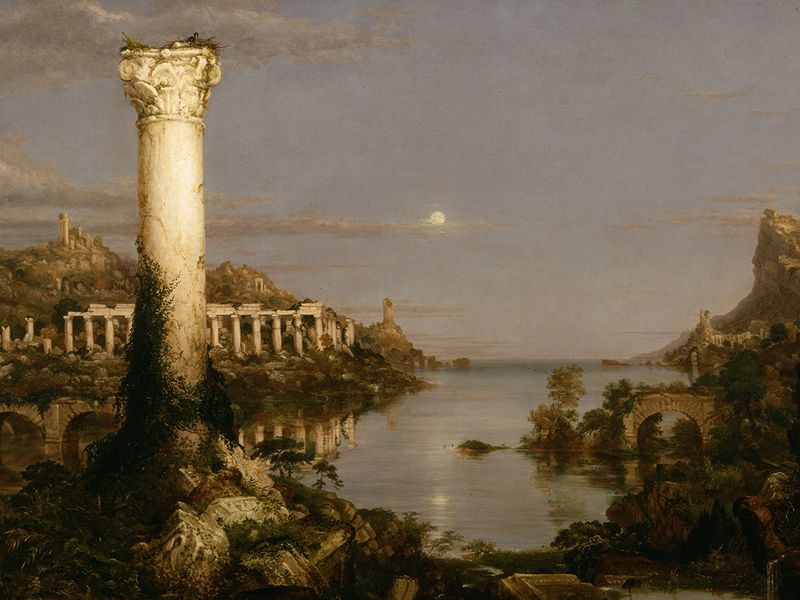
Thomas Cole’s The Course of Empire: Desolation, 1836 (Courtesy New York Historical Society/Wikipedia)
It’s easy to imagine the scene; it’s not wholly unfamiliar to the one we face currently with Covid-19. There were rumours about what was happening in far away lands, the government addressed the populace, but before many could make plans and prepare, their way of life was under attack.
The plague, named after the Antoninus family who ruled through out the plague’s duration, first appeared in the winter of 165-166 in Seleucia from an unknown source. Reports from the time suggest that the plague was spread by troops of the Roman Empire returning from their campaigns in the Near East. Once contracted by the army, it spread throughout the empire’s territories as the legions moved around through the villages and countryside.
After four years of the plague, in 169 AD, Lucius Verus was returning to Rome with Marcus Aurelius from Aquileia, when he contracted the disease. Although he would have taken some comfort in his adoptive brother being by his side, Lucius’ death was swift. The emperor’s rapid departure was labelled as ‘food poisoning’, although that is now thought to be inaccurate.
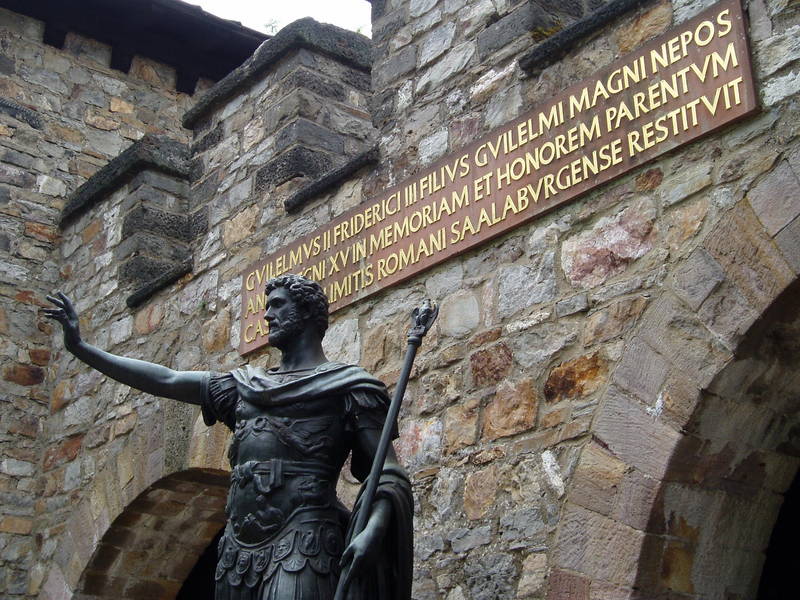
Roman Emperor Antoninus Pius (Caracalla) at the reconstructed fort at Saalburg, Germany.
Galen, the Greek physician, described the symptoms as consisting of fever, diarrhea and pharyngitis. Other symptoms included the skin erupting in boil-like blisters, ome dry and others filled with puss, which would appear around the ninth day. Galen didn’t identify the disease fully, or its origin, but some scholars believe this plague to have been smallpox.
One exception to this is historian William McNeill, who asserts that the Antonine Plague and the later Plague of Cyprian (251ca – 271) could quite possibly have been outbreaks of measles and smallpox. The survivors developed some immunity to these diseases, which suggests that neither disease had existed before 165 AD in Roman civilisations.
Sadly, this ‘great’ plague, as Galen called it, would last for many years more. For fifteen years it ravaged the Empire, from 165-180 AD. When the disease attacked the city of Rome, approximately nine years after the first outbreak, it’s believed to have caused up to 2,000 deaths per day, or a 25% chance of death for Rome’s population.
During this devastation, it’s thought that one-third of the population was killed by the plague, this includes those in the countryside and in the army, and with an estimated 5 million deaths attributed during it’s reign of terror.
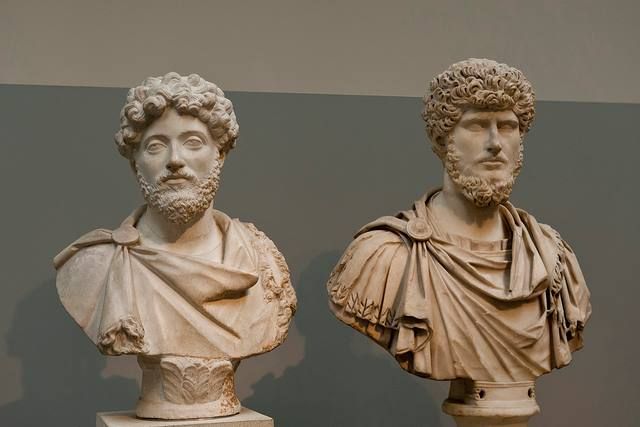
Marcus Aurelius and Lucius Verus, British Museum.
At the time, there was no treatment or cure. Rather, during wave after wave of the disease, Roman society built up immunity to its effects. However, it’s interesting to note that a plague with the same symptoms was afflicting the reigns of two Han emperors in the Near East, Huan of Han (146-168) and Ling of Han (168-189).
During the rules of these two emperors, there were outbreaks in 151, 161, 171, 173, 179, 182 and 185 – all of which have similar dates to known outbreaks in the Roman Empire, and have been suggested as being connected to the Antonine Plague in Eurasia.
It is suspected that this plague originated in some unknown and isolated part of Central Asia, and that it spread throughout the Chinese and Roman empires as trade between the two powers grew. The bulk of this trade was conducted via maritime trading, which suffered ‘irreparable’ damage as a result of the loss of life.
As such, trade with Southeast Asia slowed dramatically, and although silk and spice trade did continue into the 6th century, it would never return its full glory. Instead, the Antonine Plague’s legacy would be one that would only become apparent after 500 A.D., with the evolution of measles and its effects on our DNA.
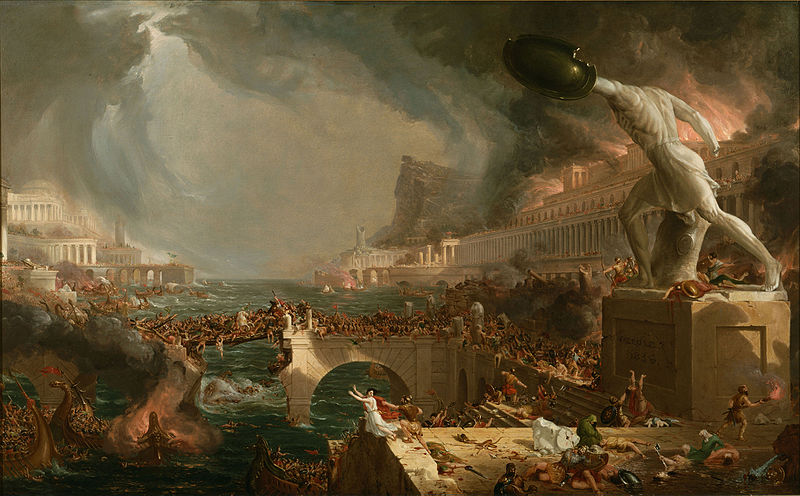
The Course of Empire (Series of paintings by Thomas Cole): Destruction (1836).
Although the Antonine Plague would have little influence over the arts or Roman culture, its social and political effects have left an indelible mark on the pages of history. With it, the plague brought the death knell of the Roman Empire, and would herald in a time of constant upheaval, betrayal, and—some would argue—insanity at the hands of a capricious dictator.
But, perhaps what we should also remember is the effect the plague had on Roman society. Amid the terror and confusion, Romans gave in to believing falsehoods, behaving badly, and acting without true understanding and honour.
Marcus’ thoughts had been plagued by another pestilence, and according to his writings in the Meditations, he was deeply troubled by what he observed. His beloved Rome was descending into chaos, wanton acts, denying fact in favour of fiction, and choosing lies over truth and justice. Perhaps we have something to learn from the following reflection of his,
“Real good luck would be to abandon life without ever encountering dishonesty, or hypocrisy, or self-indulgence, or pride. But the ‘next best voyage’ is to die when you’ve had enough. Or are you determined to lie down with evil? Hasn’t experience even taught you that—to avoid it like the plague? Because it is a plague—a mental cancer—worse than anything caused by tainted air or an unhealthy climate. Disease like that can only threaten your life; this one attacks your humanity.” Meditations, IX.2

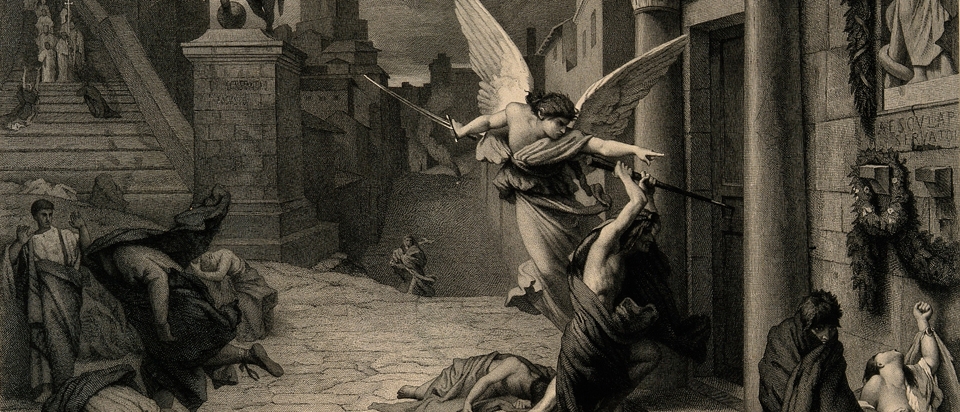








No comments
Trackbacks
Our apologies, you must be logged in to post a comment.